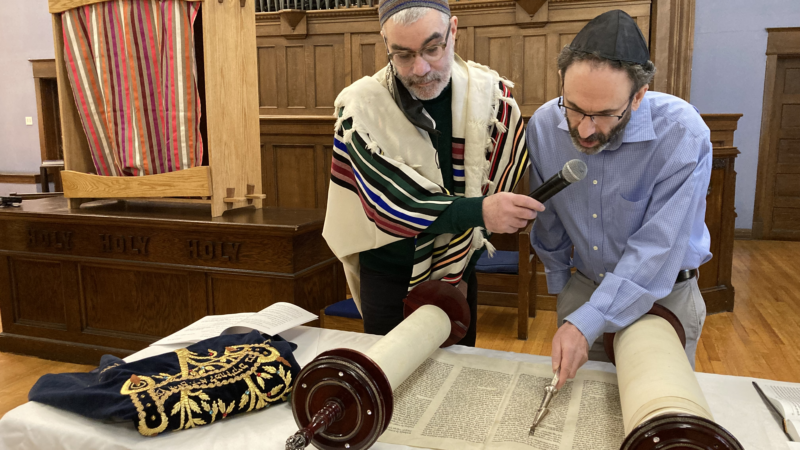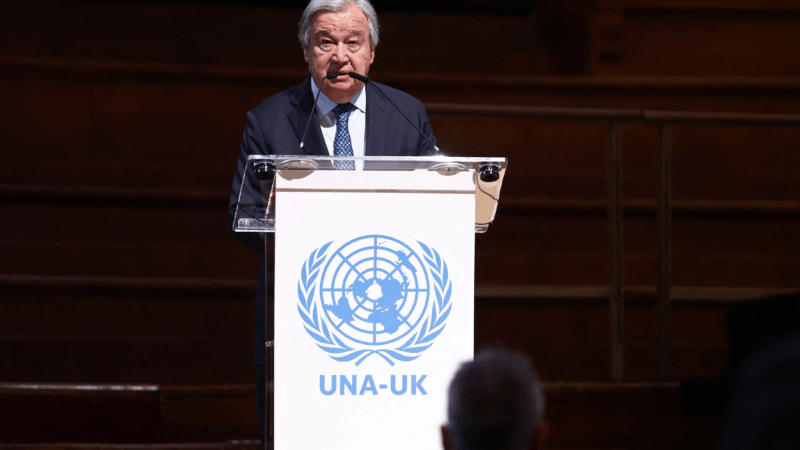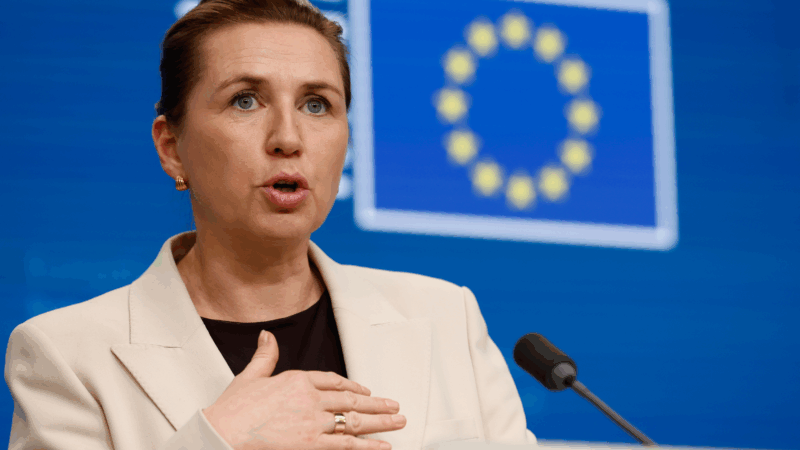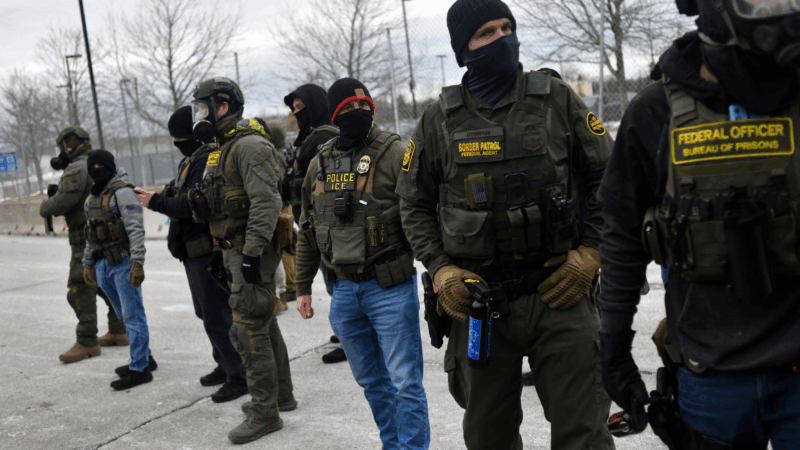This synagogue calls itself ‘anti-Zionist.’ Here’s what that means in practice
CHICAGO — Friday night Shabbat services at Tzedek Chicago have all the hallmarks of a typical service, with candle lighting and a rousing rendition of Lecha Dodi, a key hymn welcoming the Sabbath.
But this service also leads with a prayer for the people of Gaza, composed by Rabbi Brant Rosen: “In this moment of ceasefire,” a congregant reads, “let us remain steadfast in our solidarity with the people of Gaza who have resisted the relentless violence of genocide with bottomless wells of courage and resilience.”
For Rosen, solidarity with Palestinians has become a core Jewish value. He founded Tzedek Chicago — the word “tzedek” means “justice” in Hebrew — after breaking with the Zionism of his upbringing. For Rosen, the break came after a 2008 incursion by Israel on Gaza in which he felt that Israel was committing war crimes against the Palestinian people.
During a recent Shabbat meal, he talked about founding Tzedek as intentionally non Zionist.
“You know, in the very first sermon for the high holidays that I gave, I said that we have very clear core values and we’re very clear about what we stand for. And we’re not for everyone. And that’s okay. We actually stand for very specific values.”

A minority among Jews
Three years ago, Tzedek Chicago became explicitly anti-Zionist — meaning it does not support a Jewish nation-state.
That view is at odds with the vast majority of American Jews. According to a 2021 survey by the Pew Research Center, 80% of American Jews say caring about Israel is an important or essential part of what being Jewish means to them.
Most American Jewish congregations say a prayer for the State of Israel every Shabbat. Some proudly display the Israeli flag in their sanctuaries. They raise money to support Israel — more than $850 million since the October 7, 2023 attack by Hamas — according to the Jewish Federations of North America.
To these congregations, support for Israel is almost a religious tenet of American Judaism. Those who reject that tenet risk being cast out. Tzedek Chicago’s members talked about relatives who will no longer speak to them, of being fired or having to quit under pressure from previous jobs at Jewish organizations. Rosen himself was kicked off of the Chicago Board of Rabbis.
Fealty to Israel is ingrained in American Jewish culture.
“The narrative is that the world tried to kill us and Israel saved us — and it’s existential,” said Rosen. “And it’s not just a political issue. It’s not just an opinion. It’s life itself.”
Marjorie Feld, a historian at Babson College, just outside of Boston, explained the roots of that idea.
“A lot of American Jews live with that very sacred space inside of them for Holocaust consciousness,” Feld said. “And then a lot of those same people tie it to the necessity of unqualified support for Israel.”
But the war in Gaza, in which 46,000 Palestinians have been killed, according to Gazan officials, has led more American Jews to challenge that loyalty and to seek out places like Tzedek. Since the start of the war in Gaza, Tzedek has nearly doubled in size, to 430 households, many of them tuning in by Zoom from all over the world. It also meets once a month in person and offers weekly Torah study and a popular children’s program.
Palestinian rights as a Jewish value
Rosen estimates there are now some 30 other anti-Zionist congregations or prayer groups around the country. To them, basic equality and human rights are fundamentally Jewish.
“When it comes to Israel-Palestine, Jewish rights and Jewish life should be no more important or sacrosanct than Palestinian rights and Palestinian life,” Rosen said, “I get that from the Torah, and I get that from just being a human being of conscience.”
That message is especially appealing to younger Jews. Polls have shown a nearly 35 – 45 percentage point drop in support for Israel among Americans born after 1980 — highlighting a big generational divide.
Owen Howard is a 23-year-old graduate student at DePaul University who has been attending Shabbat services at Tzedek since September.
“We need to be able to decide for ourselves and not have that pushed down on us in a repressive way that we’re ostracized from the rest of Jewish society because we dared to question,” said Howard who is also president of DePaul’s Jews 4 Justice student group.

Communal resistance
Maya Schenwar, a Chicago based writer and editor, has been a member of Tzedek since it started 10 years ago. She now brings her son to the children’s program.
“For a while I felt like there was no congregation that I could belong to, where I could come and be my full self and feel dedicated to social justice, including solidarity with Palestine,” said Schenwar, 42. “When Tzedek began I felt like, OK, this is a place where I can actually live the Judaism that feels like who I want to be in the world.”
For Rosen and his congregation, being anti-Zionist means practicing a Judaism that is committed to a universalist vision of reconciliation and liberation.
This Shabbat, Rosen gave a short sermon on the importance of breathing freely, both for oneself and for others.
“The first step toward resistance and meeting the challenge of this political moment, I believe, is just taking a breath, learning how to breathe,” he said. “And then the answers will come. The relationships will be built. We will know where we need to be.”
The American Jewish community must now decide whether there is a place at the table for these new anti-Zionist spaces.
High-speed trains collide after one derails in southern Spain, killing at least 21
The crash happened in Spain's Andalusia province. Officials fear the death toll may rise.
United Nations leaders bemoan global turmoil as the General Assembly turns 80
On Saturday, the UNGA celebrated its 80th birthday in London. Speakers including U.N. Secretary-General António Guterres addressed global uncertainty during the second term of President Trump.
Parts of Florida receive rare snowfall as freezing temperatures linger
Snow has fallen in Florida for the second year in a row.
European leaders warn Trump’s Greenland tariffs threaten ‘dangerous downward spiral’
In a joint statement, leaders of eight countries said they stand in "full solidarity" with Denmark and Greenland. Denmark's Prime Minister Mette Frederiksen added: "Europe will not be blackmailed."
Syrian government announces a ceasefire with the Kurdish-led Syrian Democratic Forces
Syria's new leaders, since toppling Bashar Assad in December 2024, have struggled to assert their full authority over the war-torn country.
U.S. military troops on standby for possible deployment to Minnesota
The move comes after President Trump again threatened to invoke the Insurrection Act to control ongoing protests over the immigration enforcement surge in Minneapolis.







